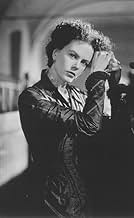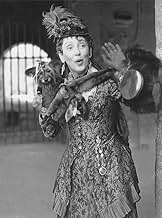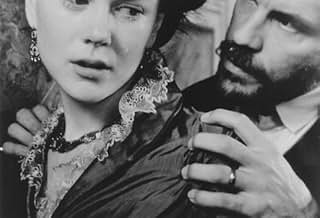AVALIAÇÃO DA IMDb
6,2/10
13 mil
SUA AVALIAÇÃO
Uma garota americana herda uma fortuna e cai em uma relação mal orientada com um cavalheiro de confiança, cuja verdadeira natureza, incluindo uma disposição afiada e gananciosa, transforma s... Ler tudoUma garota americana herda uma fortuna e cai em uma relação mal orientada com um cavalheiro de confiança, cuja verdadeira natureza, incluindo uma disposição afiada e gananciosa, transforma sua vida em um pesadelo.Uma garota americana herda uma fortuna e cai em uma relação mal orientada com um cavalheiro de confiança, cuja verdadeira natureza, incluindo uma disposição afiada e gananciosa, transforma sua vida em um pesadelo.
- Indicado a 2 Oscars
- 5 vitórias e 15 indicações no total
Amy Lindsay
- Miss Molyneux #1
- (as Katie Campbell)
- Direção
- Roteiristas
- Elenco e equipe completos
- Produção, bilheteria e muito mais no IMDbPro
Enredo
Você sabia?
- CuriosidadesFirst collaboration between director Dame Jane Campion and Nicole Kidman. However, it was Campion who discovered Kidman, where she, at the age of fourteen, was performing at Australian Theater for Young People and subsequently caught the eye of Campion.
- Erros de gravação(at around 47 mins) A horse carriage is passing through the shot from right to left. The crew with dolly-cam and equipment is clearly visible.
- Citações
Ralph Touchett: I love you but without hope.
- Cenas durante ou pós-créditosJane Campion thanks her family, Colin, Alice and Richard, for their generous support, suggestions and encouragement during the making of this film.
- Trilhas sonorasImpromptu in A Flat Major, Op 90 No. 4, D899
(1828)
Composed by Franz Schubert
Adapted for screen by Brian Lock
Performed by Jean-Yves Thibaudet (as Jean Yves Thibaudet)
Courtesy of Decca Records Company Ltd.
Avaliação em destaque
Henry James's "The Portrait of a Lady" stands as one of the greatest psychodramas in literature, a precise and coolheaded dissection of the evolution of a privileged, idealistic if slightly arrogant young woman. This work exemplifies so many qualities which distinguish his view of human nature; he is compassionate, empathetic and observant yet unyielding in exposing the follies, bad judgement and darkness inherent is his characters. No one, especially Isabel Archer, is let off the hook for their misguided choices and her fate is tragic yet completely plausible and, as laid out by James, completely compelling.
A lost opportunity is the best way to describe the film. It is interestingly photographed, full of greys, blues and whites and suggests an almost funereal solemnity in its production design and cinematography. And Nicole Kidman makes a perfect, iridescent Isabel Archer; she looks the part in every respect and certainly conveys the character's intelligence and poignant receptivity to the sights and people around her.
Would that the film had served her better; Jane Campion and the scriptwriter, Laura Jones, eviscerate James's novel but retaining the basic story and structure but put it through the meatgrinder of 90s feminist revisionism. It has been transmogrified into a simplistic tract of victimization and domestic violence, but in doing so Campion and Jones haven't managed to at least raise the story's entertainment value or even create a coherent narrative line for the audience to follow. Rather than present Isabel as a poignant, charismatic figure who unwittingly corrupts her life through bad choices and misguided idealism, the writer and director show us a woman who is victimized by a big bad Man who keeps her locked up in the house, abuses her and steals her money upon duping her into an unhappy marriage. In doing so, James's great work has been drained of its universality and dramatic impact. And while sexual exploitation and gender roles certainly play a part in sealing Isabel's fate in 19th century society, by ignoring the trenchant thematic notions of self determination and the risks of emotional idealism presented by James in his book, we are given a shallow, one-dimensional creation lacking in James's acid edge. Campion cheats a modern audience of discovering filmically a great and still-relevant work by a writer who dared to travel down the darker alleys of a more "civilized" age.
A lost opportunity is the best way to describe the film. It is interestingly photographed, full of greys, blues and whites and suggests an almost funereal solemnity in its production design and cinematography. And Nicole Kidman makes a perfect, iridescent Isabel Archer; she looks the part in every respect and certainly conveys the character's intelligence and poignant receptivity to the sights and people around her.
Would that the film had served her better; Jane Campion and the scriptwriter, Laura Jones, eviscerate James's novel but retaining the basic story and structure but put it through the meatgrinder of 90s feminist revisionism. It has been transmogrified into a simplistic tract of victimization and domestic violence, but in doing so Campion and Jones haven't managed to at least raise the story's entertainment value or even create a coherent narrative line for the audience to follow. Rather than present Isabel as a poignant, charismatic figure who unwittingly corrupts her life through bad choices and misguided idealism, the writer and director show us a woman who is victimized by a big bad Man who keeps her locked up in the house, abuses her and steals her money upon duping her into an unhappy marriage. In doing so, James's great work has been drained of its universality and dramatic impact. And while sexual exploitation and gender roles certainly play a part in sealing Isabel's fate in 19th century society, by ignoring the trenchant thematic notions of self determination and the risks of emotional idealism presented by James in his book, we are given a shallow, one-dimensional creation lacking in James's acid edge. Campion cheats a modern audience of discovering filmically a great and still-relevant work by a writer who dared to travel down the darker alleys of a more "civilized" age.
- Bishonen
- 2 de dez. de 1998
- Link permanente
Principais escolhas
Faça login para avaliar e ver a lista de recomendações personalizadas
- How long is The Portrait of a Lady?Fornecido pela Alexa
Detalhes
- Data de lançamento
- Países de origem
- Idiomas
- Também conhecido como
- The Portrait of a Lady
- Locações de filme
- Palazzo Pfanner, Lucca, Tuscany, Itália(Osmond's palace in Florence)
- Empresas de produção
- Consulte mais créditos da empresa na IMDbPro
Bilheteria
- Faturamento bruto nos EUA e Canadá
- US$ 3.692.836
- Fim de semana de estreia nos EUA e Canadá
- US$ 107.819
- 29 de dez. de 1996
- Faturamento bruto mundial
- US$ 3.692.836
- Tempo de duração2 horas 24 minutos
- Cor
- Mixagem de som
- Proporção
- 2.35 : 1
Contribua para esta página
Sugerir uma alteração ou adicionar conteúdo ausente

Principal brecha
By what name was Retratos de uma Mulher (1996) officially released in India in English?
Responda























